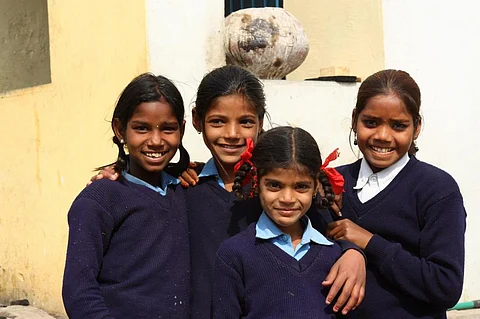75 years of independent India: Time for freedom from period shame
We found Shibani Mondal (name changed to protect identity) at an Integrated Child Development Services (ICDS) centre in suburban Kolkata amid a session on menstrual health management.
The 16-year-old girl was among a bunch of participants — shy and hesitant in sharing their experiences. Most of them were not quite familiar with sanitary napkins, as pieces of cloths were all they had been using during their periods.
Shibani was curious about how to use sanitary pads and asked how long should she be using the same pad in a day. She claimed that because their school didn't have suitable disposal facilities, and washrooms being unclean enough, she simply skipped going to school during those days.
While narrating her experiences, her expression made it clear that she had to face many uncomfortable situations, even at home, as neither her Mom nor the elder sisters were ready to discuss these ‘dirty things’ with her.
We spoke to the other girls in the group, only to find that most of them had similar experiences and almost none were accustomed with proper management of menstrual hygiene and wellness.
Just think about it! Even as the Indina Space Research Organisation sends a satellite built by 750 schoolgirls to mark 75 years of indepencdence, our adolescent girls still miss out on school during their periods and even hesitate to talk openly about menstrual health and hygiene.
A quick look at the existing data suggests that more than half (52 per cent) of adolescent girls are unaware of menstruation until they get it themselves, and one out of every four girls between 15-19 years do not practice proper menstrual hygiene.
A society where girls equally participate with their male counterparts in almost every sphere of life and work, discrimination against menstruating young women is still rampant in India, with periods having been considered a taboo and associated with impurity.
So much so that since puberty sets in, girls are socially programmed to live with the pain and fear, and are seldom allowed to seek help when in acute physical or mental discomfort due to periods — thanks to the aura of embarrassment that shrouds the topic.
To bust this narrative, to shun the culture of silence and help young girls fight ‘period shaming’, non-profit CRY — Child Rights and You has launched a pan-India campaign #Let’s Talk About It! Period! — to address taboos around periods and help them understand menstruation better, so that they do not feel ashamed or embarrassed of bleeding, which is a but a natural physiological phenomenon.
Through this initiative, we aim to encourage adolescent girls to openly talk about periods as a normal body function instead of a topic that incites shame and embarrassment; address myths and taboos related to menstruation and shed light on the facts; and inspire a circle of support for adolescent girls including their family members, male peers, teachers and community allies.”
Historically, the culture of silence and the social stigma attached to periods have been fueled by the patriarchal narrative deeply ingrained in our culture and social norms, and is fed by girls’ lack of knowledge around menstruation. It is absolutely crucial to demystify myths and raise awareness on menstruation to help young girls especially in underprivileged communities break away from the age-old shackles of period shaming so that they can solely focus on taking care of their health, access menstrual hygiene with freedom and live with dignity.
Menstrual health and hygiene is an integral part of adolescent girls’ health and CRY has been extensively working with various stakeholders on menstrual health and hygiene since the last decade and also published Life Skills modules focusing on the same.
This campaign is an organic extension of our strong focus on addressing various issues that pull back young girls and women from accessing MHM.
Though the primary target group of the three month-long campaign are girls within the age group of 10-17 years, the secondary audience includes adolescent boys, family members and the community members. The campaign will culminate on the International Girl Child Day (October 11, 2022).
As part of the campaign, CRY will also conduct a survey among girls within its intervention areas — to assess their levels of understanding, knowledge, attitude, and practice when it comes to managing menstrual health and hygiene, and to assess the myths, misconceptions and restrictions practiced by girls during menstruation.
The survey will be conducted among more than 4,000 respondents across the rural and urban intervention areas in eight states, namely West Bengal, Assam, Uttar Pradesh, Madhya Pradesh, Tamil Nadu, Andhra Pradesh, Maharashtra and Chhattisgarh.
The campaign further aims at orientation and capacity building of all concerned stakeholders on adolescent hygiene and management of MHH.
Other advocacy initiatives under the campaign will include incorporating components related to best practices of adolescent health and hygiene, advocacy at the rural and urban areas towards ensuring functional toilets and availability of water; and building a conversation with all stakeholders towards free distribution and seamless access of sanitary products, both at the state and the union levels.
But, as always, none of our campaigns are complete until each and every individual from all walks of life come forward and join hands to spread the message.
This Independence Day we need you to take initiative and join us in ending period shame and start to have open conversations about menstruation, menstrual health and hygiene. Let’s talk about it; period.


